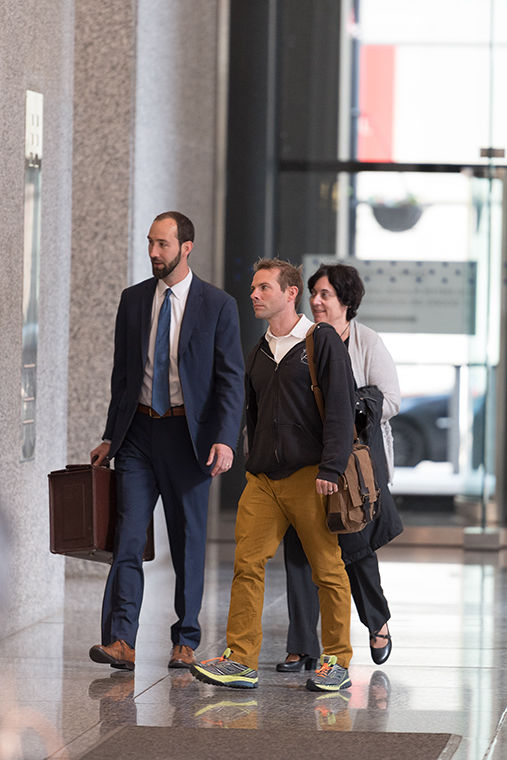NLRB hearing begins with college, staff questioning
Attorney Michael Persoon (Left) along with Nic Ruly (center) and part-time faculty union president Diana Vallera enter the Dirksen Federal Building 219 S. Dearborn St., Suite 808 on May 18 for a hearing regarding a dispute between P-Fac and full-time staff members who teach part-time.
May 23, 2016
Columbia College’s adjunct union, P-Fac, is contesting the right of staff workers, who are presented by the U.S. of C.C., to teach part-time classes at a National Labor Relations Board hearing that began on May 18 and continues this week.
The NLRB hearing, held at the Everett McKinley Dirksen United States Courthouse, 219 S. Dearborn St., is the preliminary step in deciding if the group of approximately 55 full-time staff members at the college who teach part-time should be represented by P-Fac or should be teaching at all, which the union’s steering committee says takes away classes from part-time faculty and is against their contract.
Michael Persoon, P-Fac’s attorney at Despres, Schwartz & Geoghegan, Ltd., said in his introductory statement May 18 that full-time staff who teach are excluded from the adjuncts’ union and “are not appropriate to be placed in it,” adding that their formation could create a “competing minority bargaining unit.”
Though the NLRB ruled in the Summer of 2015 that “there is no question for [staff who teach]..P-Fac is their exclusive collective bargaining representative” in matters regarding teaching,” P-Fac’s steering committee and legal representation said that ruling only stopped the staff members from starting their own competing union and did not mean they had a right to join P-Fac, as reported Nov. 23, 2015, by The Chronicle.
While the college is not necessarily against the group’s desire to organize, despite rejecting its petition to do so based on its agreement with P-Fac, it also desires “labor peace,” according to Terence Smith, the college’s special counsel for labor relations.
Associate Provost for Academic Personnel Pegeen Quinn, who served as the college’s witness, explained the tier system that determines the order in which adjuncts are given courses under P-Fac’s latest contract beginning in 2013, which pushes full-time staff members to the last tier and allows for experienced union members to receive classes after full-time faculty and lecturers.
Quinn also explained that while full-time staff who taught part-time are not under the P-Fac contract, they were still asked by the college to fill in the same teaching availability forms, received same letters explaining their assignments and pay as well as other nearly identical practices, something Persoon asked if the college did “unilaterally.”
Questions from Persoon about the full-time staff members’ current status as faculty members, their work history as well as qualifications for teaching part-time–whether through education or work experience—were all asked of the six witnesses called, who represented the full-time staff who have taught in previous semesters.
Persoon also asked nearly all staff witnesses whether they have ever asked to work late for their staff position, which would possibly cut into their classes that are mostly taught in the evening, most of which explained they have never been asked to do so.
“My understanding of [a] salary employee is my employer can ask me to work late and not pay me more, or come in early or work on a Saturday…I’m at the employer’s whim,” Persoon said.
Jill Sultz, a college advisor in the College Advising Center who taught part-time consistently in the Cinema Art + Department from 2000 until the Spring 2015 Semester, had a cross-examination that resulted in Persoon and P-Fac President Diana Vallera leaving the room after questions about her filmmaking qualifications were denied by hearing officer Matthew Persons, which Persoon called “seriously prejudiced of [their] rights” not to explore in-depth.
Sultz, who said she has accumulated over 300 credit hours, said she used to also be a P-Fac member before becoming an advisor in March 2014.
“It’s laughable to me because we’re all very qualified to teach, and [P-Fac] is trying to find some justification,” Sultz said.
Tanya Harasym, operations coordinator of the Learning Studio who also previously taught “Writing and Rhetoric I” in the English Department and multiple women’s studies courses in the Humanities, History & Social Sciences Department, was also questioned about her qualifications to teach in the HHSS Department without a “terminal degree” in the field she was teaching. Harasym, earned a master’s degree in adult education from National Louis University in 2000 and a graduate certificate in women’s studies from DePaul in 2014.
Harasym also discussed being removed from teaching a class she created, “Transnational and Global Feminism” during the Spring 2015 Semester. She added that the class was then given to a P-Fac member because of a grievance from the union about adjuncts not getting classes they were qualified for.
Harasym, who said she does not think her position as a staff member did affect the classes she received, added that her experiences working in the Learning Studio were helpful as a faculty member in understanding the college’s method of teaching.
“[This process] is not easy,” Harasym said. “It’s nerve-wracking for one, but it’s very emotional…going on three years for some people who haven’t been able to be in the classroom, it’s what brings us joy and reward in our lives.”
A P-Fac email to its members on May 23 stated the following: “Essentially, what is going on in this trial is that the full-time staff are suing part-time faculty to get more classes because their incomes are unconscionably low. The college is giving staff a raise only by taking hours away from adjuncts. We learned during the trial this week that a lot of these staff members are paid $40,000 a year after 12-15 years of service. Any institution of higher education worth its mettle would be embarrassed by this low figure and would be held accountable.”
Persoon and Vallera both declined to comment outside of the hearing. Hearings will continue May 24-25 and into the following week until completion.








